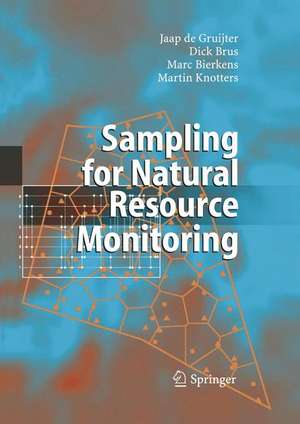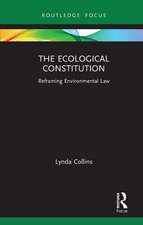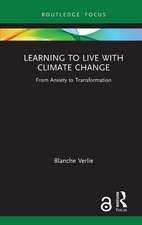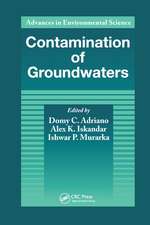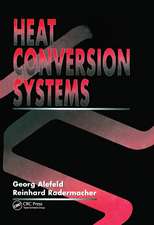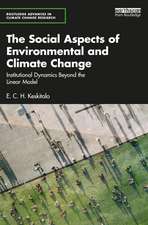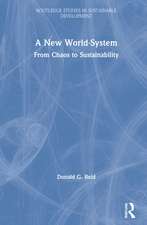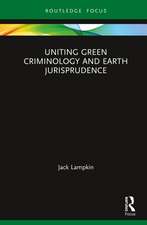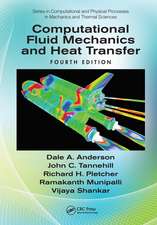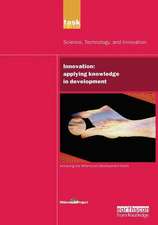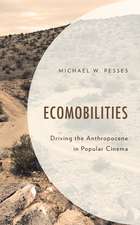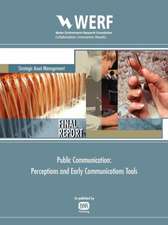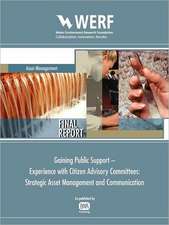Sampling for Natural Resource Monitoring
Autor Jaap de Gruijter, Dick J. Brus, Marc F.P. Bierkens, Martin Knottersen Limba Engleză Paperback – 12 feb 2010
| Toate formatele și edițiile | Preț | Express |
|---|---|---|
| Paperback (1) | 1382.51 lei 43-57 zile | |
| Springer Berlin, Heidelberg – 12 feb 2010 | 1382.51 lei 43-57 zile | |
| Hardback (1) | 1390.89 lei 43-57 zile | |
| Springer Berlin, Heidelberg – 22 feb 2006 | 1390.89 lei 43-57 zile |
Preț: 1382.51 lei
Preț vechi: 1686.00 lei
-18% Nou
Puncte Express: 2074
Preț estimativ în valută:
264.63€ • 287.54$ • 222.43£
264.63€ • 287.54$ • 222.43£
Carte tipărită la comandă
Livrare economică 21 aprilie-05 mai
Preluare comenzi: 021 569.72.76
Specificații
ISBN-13: 9783642061325
ISBN-10: 364206132X
Pagini: 348
Ilustrații: XIV, 334 p.
Dimensiuni: 155 x 235 x 18 mm
Greutate: 0.49 kg
Ediția:Softcover reprint of hardcover 1st ed. 2006
Editura: Springer Berlin, Heidelberg
Colecția Springer
Locul publicării:Berlin, Heidelberg, Germany
ISBN-10: 364206132X
Pagini: 348
Ilustrații: XIV, 334 p.
Dimensiuni: 155 x 235 x 18 mm
Greutate: 0.49 kg
Ediția:Softcover reprint of hardcover 1st ed. 2006
Editura: Springer Berlin, Heidelberg
Colecția Springer
Locul publicării:Berlin, Heidelberg, Germany
Public țintă
ResearchCuprins
Designing Schemes for Survey and Monitoring.- Modes of Sampling and Statistical Inference.- Basic Design Principles.- Major Design Decisions.- Optimization of Sample Selection.- Sampling in Space.- to Sampling in Space.- Global Quantities in Space.- Local Quantities in Space.- Variograms.- Sampling in Time.- to Sampling in Time.- Global Quantities in Time.- Local Quantities in Time.- Time-Series Models.- Sampling in Space-Time.- to Sampling in Space-Time.- Global Quantities in Space-Time.- Local Quantities in Space-Time.
Recenzii
From the reviews:
"Four pedometricians have written this new book on sampling. They are often consulted by colleagues who need to plan sampling schemes for monitoring, but have not felt able to recommend a book … . Here they aim to fill the gap with a sufficiently comprehensive overview of the topic so that that reader can choose an appropriate sampling method. … This is an indispensable and timely book. It draws together a lot of material that has not previously been put into a common framework." (R. M. Lark, European Journal of Soil Science, Vol. 58, 2007)
"The present book provides the statistical methodology of monitoring that gives applied scientists’ sufficient guidance on how to design a monitoring scheme, which design decisions have to be taken, and how to optimize the sample selection. … the focus is on practitioners in the field of natural resource monitoring rather than statisticians … ." (International Journal of Environmental and Analytical Chemistry, Vol. 86, 2006)
"This is a resource book for people interested in sampling for natural resource surveying and monitoring. … This is not only a reference book on monitoring, but also on surveying natural resources. It is rare that a book not only includes the design phase of estimation, but also the sampling and analysis phases of experimentation. The book is well organized and written. … In summary, this is an excellent reference book on how to sample for natural resource monitoring and survey." (Richard E. Zartman, Journal of Environmental Quality, January/February, 2007)
"Sampling for Natural Resource Monitoring provides a comprehensive introduction to natural resource sampling design for students, scientists, and managers. … The emphasis on cost analysis and optimization throughout the book is perhaps one of its greatest strengths. … The tendency to generalize across disciplines instead of focusing on specific examples is also one of thebook’s strengths: it should be equally useful for individuals concerned with soil fertility, soil quality, environmental contamination, biodiversity conservation and many other natural resource issues." (Jeffrey E. Herrick, Soil Science Society of America Journal, Vol. 71 (4), 2007)
"This is a quite different and unique book about sampling that should be required reading for everyone working in the earth and environmental sciences. … I have discovered lots of ‘ah-hahs’ in this book. … the most important contribution of this book is the clarity by which it explains the difference between the design- and model-based approaches. … the text is pretty clean and very readable. … I highly recommend it and offer the authors my congratulations on a job well done." (Timothy C. Coburn, Mathematical Geosciences, Vol. 40, 2008)
"The aims and scope of the book are set out clearly, namely to provide practitioners with the statistical knowledge and methodology for survey and monitoring of natural resources. … This book is well written and has a clear structure with good cross-referencing of topics throughout. … I recommend the book to all environmental scientists involved with survey and monitoring and to those who have to design surveys in precision agriculture; they should find it a valuable companion." (Margaret A. Oliver, Precision Agriculture, Vol. 9, 2008)
"The book is organized well and is divided into four parts. … appears to be edited thoroughly and proofread carefully. … To summarize, the book is important for regulatory authorities and scientists involved in survey and monitoring activities. It fills a gap between theoretical books and how-to manuals. … serve as a reference book for researchers and field officers involved in survey and monitoring of natural resources. It also can be a good reference book at training programs for field officers or research scientists." (Sharad D. Gore, Journal of the American StatisticalAssociation, Vol. 103 (482), June, 2008)
"Four pedometricians have written this new book on sampling. They are often consulted by colleagues who need to plan sampling schemes for monitoring, but have not felt able to recommend a book … . Here they aim to fill the gap with a sufficiently comprehensive overview of the topic so that that reader can choose an appropriate sampling method. … This is an indispensable and timely book. It draws together a lot of material that has not previously been put into a common framework." (R. M. Lark, European Journal of Soil Science, Vol. 58, 2007)
"The present book provides the statistical methodology of monitoring that gives applied scientists’ sufficient guidance on how to design a monitoring scheme, which design decisions have to be taken, and how to optimize the sample selection. … the focus is on practitioners in the field of natural resource monitoring rather than statisticians … ." (International Journal of Environmental and Analytical Chemistry, Vol. 86, 2006)
"This is a resource book for people interested in sampling for natural resource surveying and monitoring. … This is not only a reference book on monitoring, but also on surveying natural resources. It is rare that a book not only includes the design phase of estimation, but also the sampling and analysis phases of experimentation. The book is well organized and written. … In summary, this is an excellent reference book on how to sample for natural resource monitoring and survey." (Richard E. Zartman, Journal of Environmental Quality, January/February, 2007)
"Sampling for Natural Resource Monitoring provides a comprehensive introduction to natural resource sampling design for students, scientists, and managers. … The emphasis on cost analysis and optimization throughout the book is perhaps one of its greatest strengths. … The tendency to generalize across disciplines instead of focusing on specific examples is also one of thebook’s strengths: it should be equally useful for individuals concerned with soil fertility, soil quality, environmental contamination, biodiversity conservation and many other natural resource issues." (Jeffrey E. Herrick, Soil Science Society of America Journal, Vol. 71 (4), 2007)
"This is a quite different and unique book about sampling that should be required reading for everyone working in the earth and environmental sciences. … I have discovered lots of ‘ah-hahs’ in this book. … the most important contribution of this book is the clarity by which it explains the difference between the design- and model-based approaches. … the text is pretty clean and very readable. … I highly recommend it and offer the authors my congratulations on a job well done." (Timothy C. Coburn, Mathematical Geosciences, Vol. 40, 2008)
"The aims and scope of the book are set out clearly, namely to provide practitioners with the statistical knowledge and methodology for survey and monitoring of natural resources. … This book is well written and has a clear structure with good cross-referencing of topics throughout. … I recommend the book to all environmental scientists involved with survey and monitoring and to those who have to design surveys in precision agriculture; they should find it a valuable companion." (Margaret A. Oliver, Precision Agriculture, Vol. 9, 2008)
"The book is organized well and is divided into four parts. … appears to be edited thoroughly and proofread carefully. … To summarize, the book is important for regulatory authorities and scientists involved in survey and monitoring activities. It fills a gap between theoretical books and how-to manuals. … serve as a reference book for researchers and field officers involved in survey and monitoring of natural resources. It also can be a good reference book at training programs for field officers or research scientists." (Sharad D. Gore, Journal of the American StatisticalAssociation, Vol. 103 (482), June, 2008)
Caracteristici
Presents to practitioners in all fields related to environmental sciences the statistical knowledge and methodology of sampling and data analysis useful for spatial inventory and monitoring of natural resources All theory not essential for applications or for basic understanding is omitted
